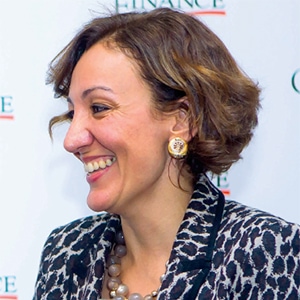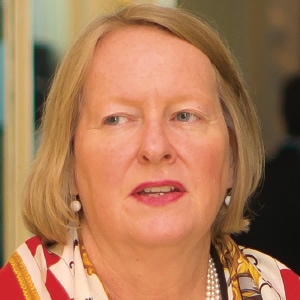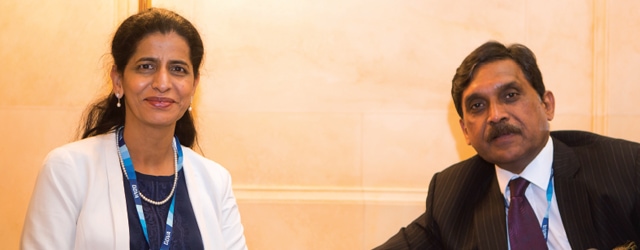Global Finance honors excellence in trade and supply chain finance at banker gathering in Madrid.

The title—“Back to the Future?”—was possibly a little mischievous, given recent political trends; yet the discussions at this year’s Bankers Association for Finance and Trade (BAFT) Europe Bank-to-Bank Forum were anything but impish.
“Throughout the Bank-to-Bank Forum, we had discussions on the issues that keep us awake at night,” said Esther Galiana, managing director and head of financial institutions at BBVA and one of the event’s moderators. “We all know that the best way to prepare for the future is to try to anticipate it.”

The last day of the forum included a luncheon honoring the winners of Global Finance magazine’s annual Best Trade Finance Providers and Best Supply Chain Finance Providers awards. Executives accepted prizes on behalf of their companies while continuing the valuable industry dialogue.
Peter Jameson, managing director and co-head of EMEA product management at Bank of America Merrill Lynch, pointed out that BAFT’s spot on the calendar (this year’s event ran January 16-18) makes it a great time to formulate a relevant approach for the year ahead. A regular attendee, he has seen how the discussion evolves.
“At last year’s meeting, blockchain and digitalization were first being discussed,” Jameson noted. “[Since then] we have been coming to terms with these new technologies, so in that sense the 2017 forum was almost a coming-of-age event for these topics.”
Distributed ledger and digital technologies continue to stimulate new developments in the industry. “Innovation was the buzzword,” said BBVA’s Galiana. “New entrants and emerging technologies [blockchain, the Internet of Things and Big Data] are expected to change the transaction banking landscape. Many incumbent banks are partnering with fintechs, but banks are also generating internally an innovation culture that spurs their own projects to satisfy clients’ needs.”

Hot topics included how the antiglobalist populism apparently taking hold around the world will likely impact global trade and supply chains. “The new politics took center stage,” said Jameson. “There has been a shift in outlook, from seeing things as a collection of country-risk concerns to the broader emerging trend around antiglobalization sentiment. If this continues, what are the likely impacts on our clients and on our businesses?”
Uncertainty over China’s growth and trade raised other questions. For Robert O’Donoghue, global head of working capital solutions at ING, “Asia is key geographically from a trade flow perspective, and the performance of China is crucial.”
Changes impacting supply chain financing were a key point of interest for O’Donoghue. “New nonbank or bank-agnostic entrants are creating disruption to the traditional marketplace, and the banks are required to navigate a growing number of competitive and regulatory challenges,” he said. “In addition, the question is being asked in the accounting sphere whether supply chain financing is to be treated as a trade-payables obligation or as bank debt.”
Of course, security and privacy continue to be central to industry discussions. “Three themes stuck with me: cybersecurity, technology and regulation,” said James Rausch, head of client coverage Canada, and global head of transaction banking—banks, brokers and exchanges at RBC. “These topics consume most of my time at RBC Investor & Treasury Services, and I found the discussion relevant, particularly around derisking.”

On regulation, leading banks seem to be growing more pragmatic. “I gained the impression” observed Jameson, “that we are moving from reacting to a tidal wave of regulation to discussing more-technical issues that the industry must address.”
“If there was a pivotal issue,” he added, “then it was cybersecurity and its relationship with data-sharing.” He pointed out that new European legislation was moving banks toward an API [application programming interface] model, whereby a customer can operate accounts through technology provided by a third party.
“While previously, cybersecurity was largely an internal matter for each bank, now this becomes a multibank consideration with third parties intermediating between customers and banks,” stated Jameson. “With this greater complexity come questions as to who is responsible for security. If anything goes wrong, there is serious reputational risk for the industry as a whole.”
 |
 |
 |
|
 |
 |
 |
|
 |
 |
 |
|
 |
 |
 |
 |



